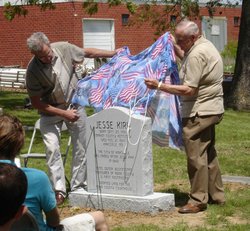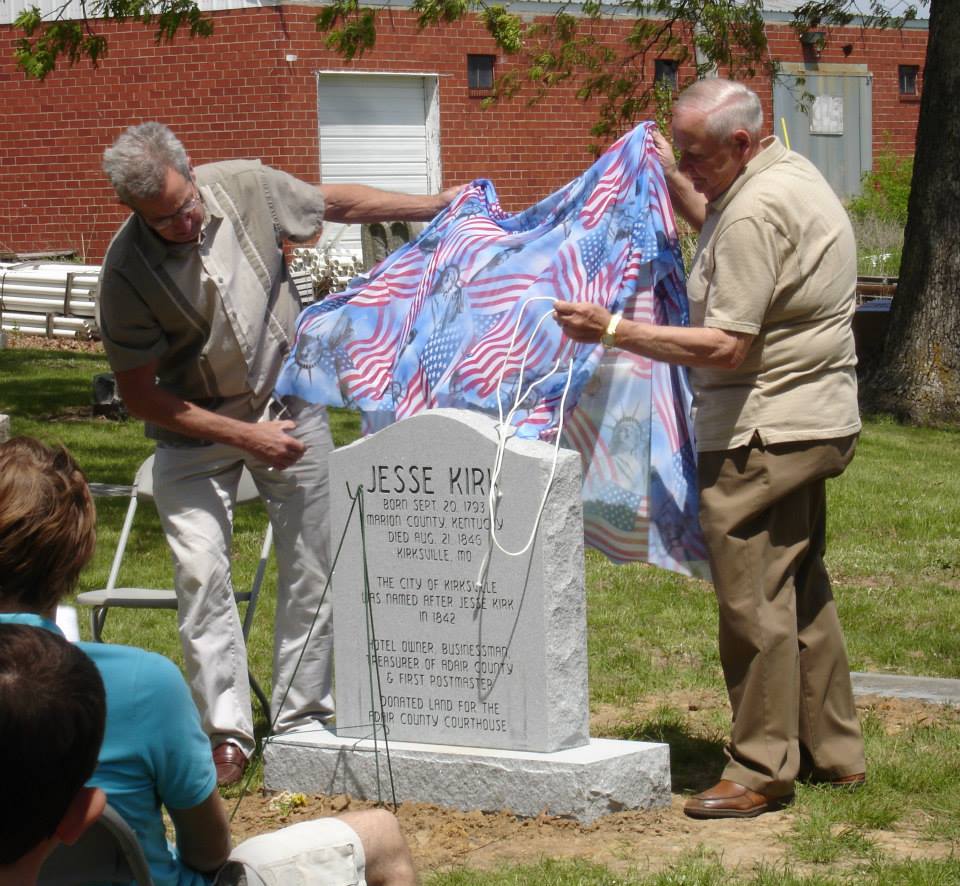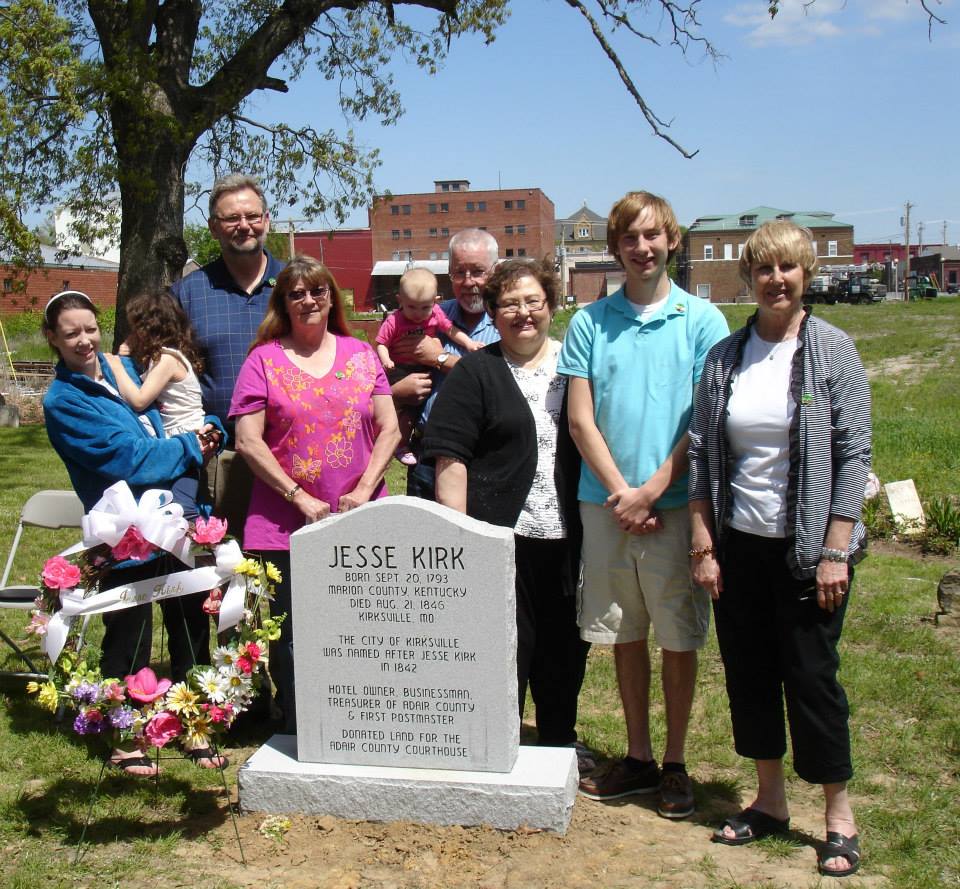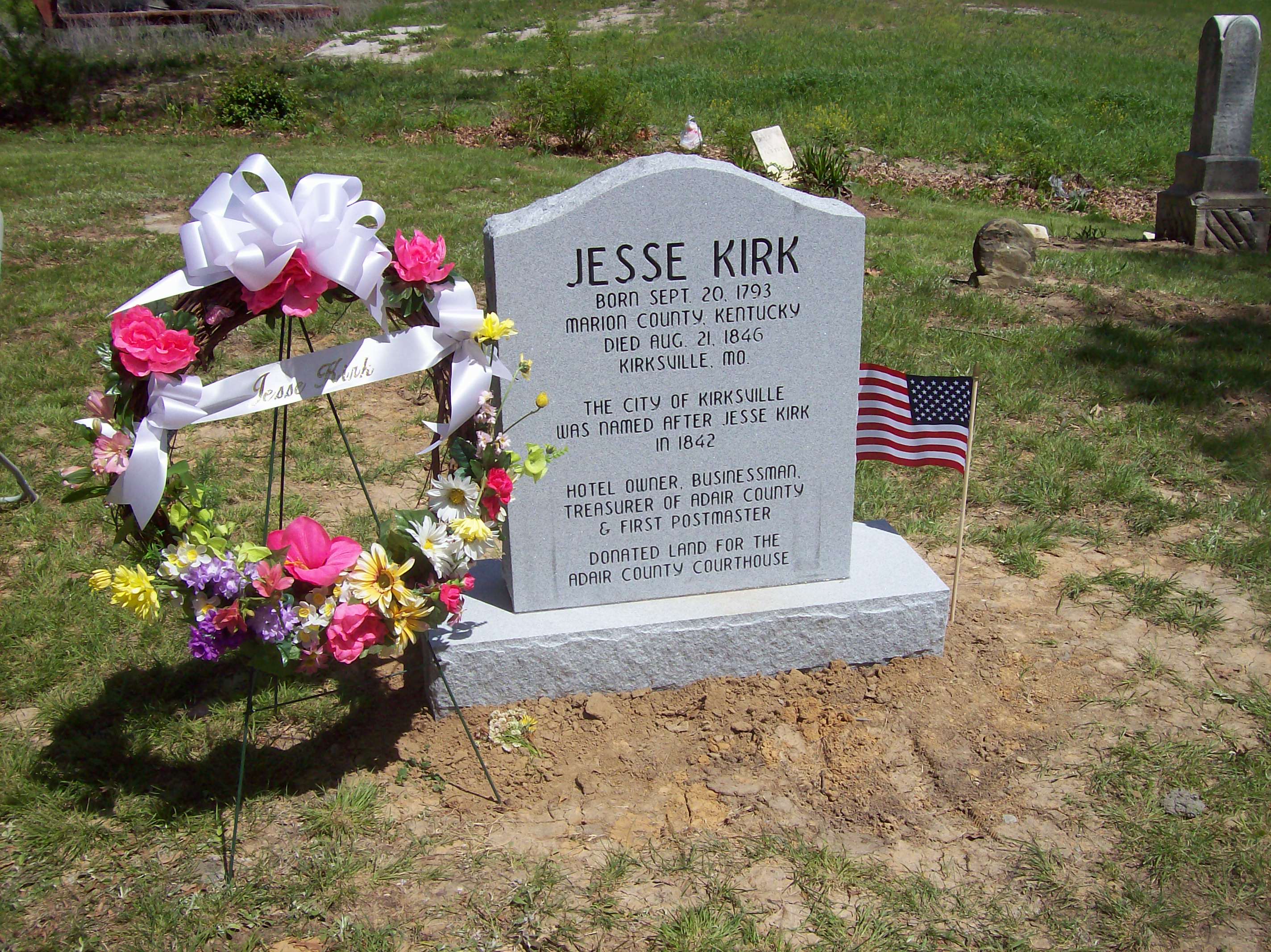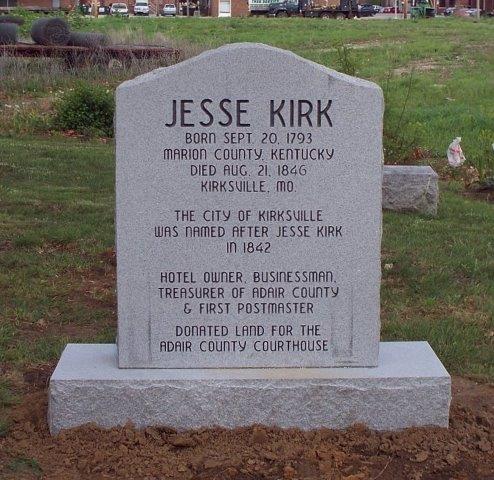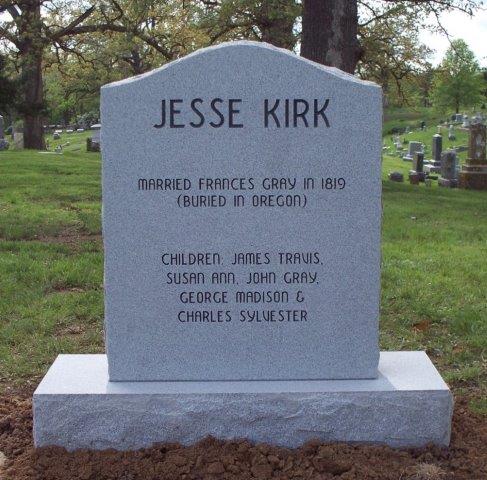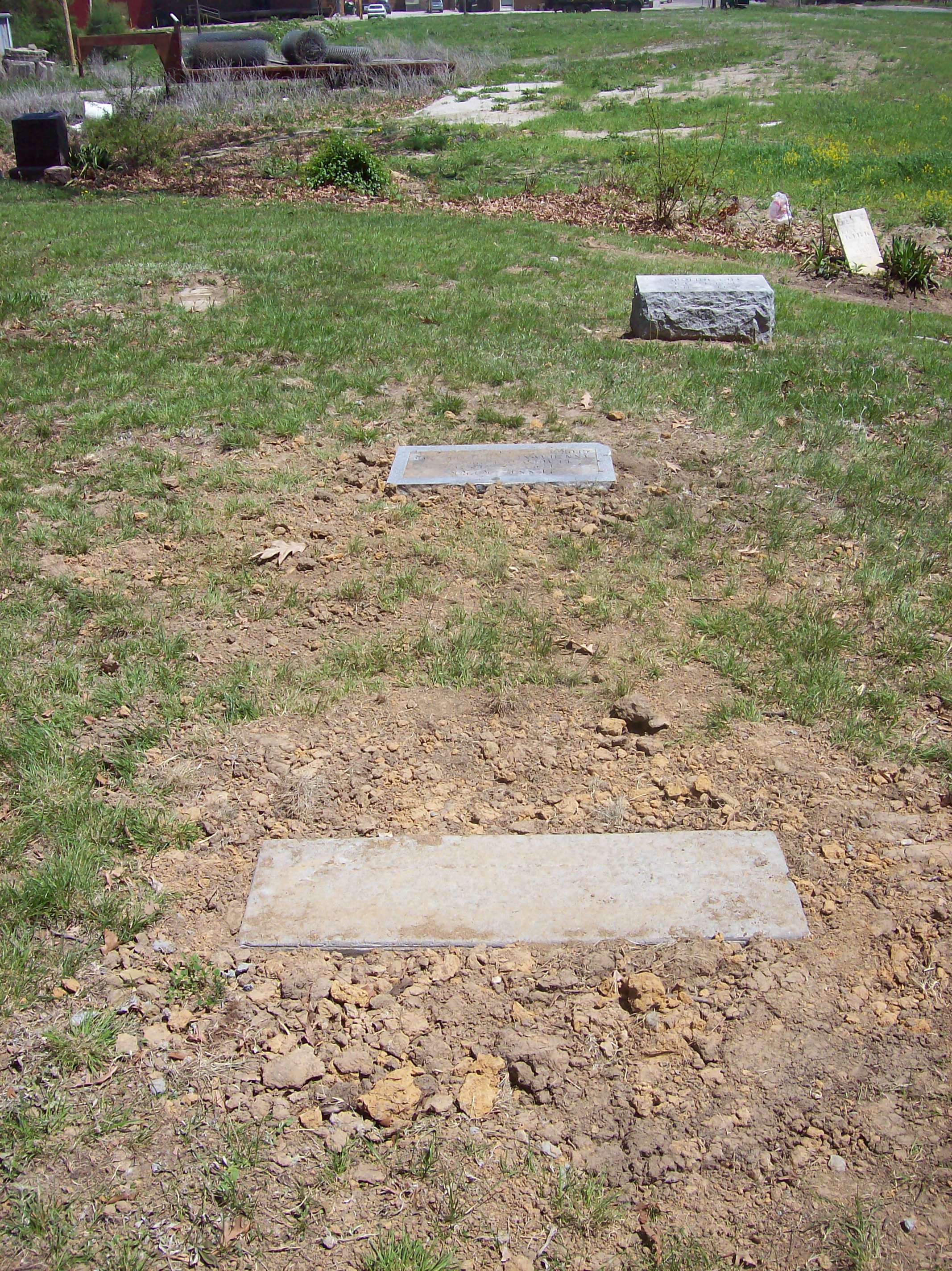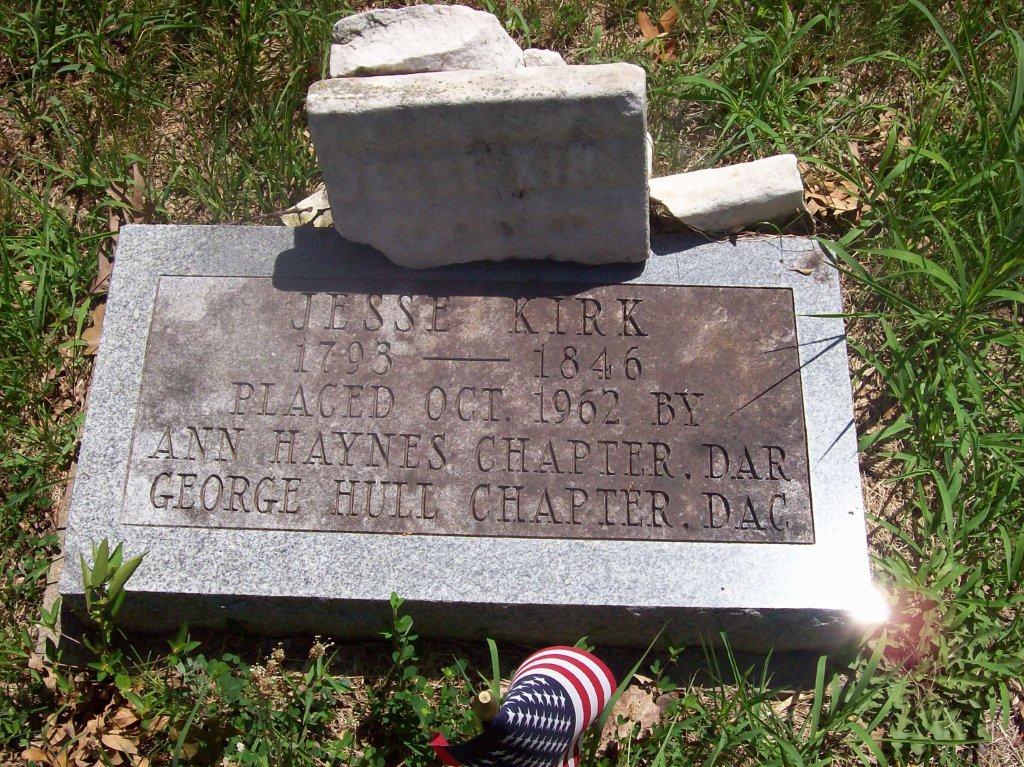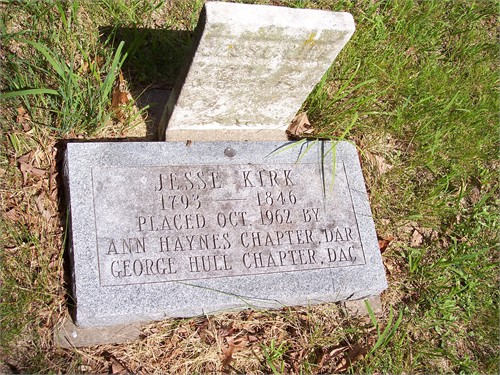Jesse Kirk was one of the first settlers in what is now the city limits of Kirksville, Adair County, Missouri. He built a hotel, tavern, and post office in the area where the now-abandoned Willard Elementary School is located on Centenniel Street in Kirksville. His buildings were made of hewed logs. He served as the first Postmaster and the first Treasurer of Adair County. He donated the land for the city square in Kirksville, and after his death, the Adair County Courthouse was built on this land (according to his descendants).
The town of Kirksville was laid out in 1841 and became the county seat of Adair County on May 18, 1842. Surveyers who laid out the town were treated to a dinner and drinks at Kirk's establishment in 1841, and some say in this way Jesse Kirk bribed them to name the town after him. However, it was a year later that the Adair County Court made the decision to name the town Kirksville. This settlement was once known as Long Point or Hopkinsville, but was given the permanent name of Kirksville when it became the seat of Adair County in 1842.
Jesse Kirk was the son of James Kirk (1759-1857) and Anna (Horton) Kirk (1762-1838). Jesse's father was a revolutionary soldier who had fought at Yorktown. His parents were both born in Virginia and migrated to Kentucky where Jesse and most of his siblings were born. Jesse's mother died in Kentucky in 1838 and his father remarried. His father lived to be 98 years old and also died in Kentucky. James and Anna Kirk are buried near Lebanon in Marion County, Kentucky.
Jesse had the following known siblings:
Edward Braxton Kirk 1788-(after 1860)
Dixon/Dockson Kirk 1790-1856
John Kirk 1791-1856
Mary Polly Kirk 1796-1865
Travis Kirk 1798-1854
Robison Kirk 1799-1837
Marion Kirk 1801-
Lucy (Kirk) Cleaver 1805-1883
On December 14, 1819, Jesse married Frances "Fannie" Gray, who was born in Tennessee in 1804. They had the following known children:
1. James Travis Kirk 1820- 1907 (married Virginia Ann Adkins and Nancy Ann Bruce)
2. Susan Ann Kirk 1822-1870 (married James Adkins)
3. John Gray Kirk 1825-1899 (married Minerva Sloan)
4. George Madison Kirk 1827- (married Ann Eliza Withrow) - Memorial 37182900, buried in Oregon
5. Charles Sylvester Kirk 1830-1911 (married Caroline Withrow)
All of Jesse and Frances Kirk's children were born in Kentucky, then the family came as pioneers to northern Missouri. The U. S. General Land Office has four records of land purchased by Jesse Kirk beginning in 1835 in Randolph County, Missouri. However, Randolph County at that time included what later was divided to become Adair County, Missouri, so the specific locations of his land purchases are not known, except for the legal descriptions.
Sometime between about 1835 and 1840, Jesse Kirk settled in what would later become the city of Kirksville, Missouri, and built his hotel and other business enterprises.
Forest-Llewellyn Cemetery was created in 1845 when a man traveling through town passed away and they needed a place to bury him. This burial location was probably not given a name at that time. It was later called the City Cemetery, then the Forest Cemetery, and now the Forest-Llewellyn Cemetery. The second person to be buried in this cemetery was Jesse Kirk in 1846. He was 52 when he died and his grave at that time was marked by a small white stone. It is possible this cemetery was started on land owned at that time by Jesse Kirk since it was only 3 blocks south of where his home and tavern were located.
About 20 years after Jesse's death, in the spring of 1865, his wife Frances and 4 of their 5 grown children (James Travis, Susan Ann, George Madison, and Charles Sylvester) and their families moved to the State of Oregon. The wagon train of 114 wagons was led by son James Travis Kirk. Son John Gray Kirk and his family were the only members of the Kirk family who stayed behind in Kirksville. John Gray Kirk would later be killed by a tornado that swept through Kirksville in 1899.
The wagon train led by James Travis Kirk traveled from Kirksville, Missouri, to Heppner, Oregon. James' sister, Susan Ann and her husband James A. Adkins settled near Heppner, Oregon. James Kirk's brother, Charles Sylvester Kirk & his wife, Caroline Withrow Kirk, settled in Umatilla County, Oregon. His other brother, George M. Kirk and his wife, Ann Withrow Kirk, went to Lane County, Oregon.
Jesse Kirk's wife Frances died in Junction City, Lane County, Oregon in 1867 and is buried there in the same cemetery as a granddaughter. Her 4 children mentioned above who also went to Oregon are buried in other cemeteries in the area. Her son John Gray Kirk and his wife Minerva are buried in Kirksville, Missouri.
The following was written by Minerva (Sloan) Kirk, daughter-in-law of Jesse Kirk. Minerva's father, David Sloan, was the first white person to settle within what became the original city limits of Kirksville, and Jesse Kirk was his neighbor to the northwest.
"In 1840, Adair County was then a vast unoccupied territory, except for a few settlements. In the fall of 1840 the county was surveyed by Pleasant Ford and George Taylor. They determined that the center of the county was near our public square. This caused a great deal of contention, but was finally settled by three commissioners, who decided the center of the county to be the proper place for the county seat. It was first called Hopkinsville, but no final decision was made concerning the naming until 1842 when the county judges decided that it should be named Kirksville in honor of Jesse Kirk, who kept a hotel in town. Jesse Kirk gave a grand frontier reception in honor of the decision. The old hewed log hotel where Jesse Kirk held his reception was on what is now Centennial Street [where Willard School now sits]. The feast consisted of roast venison, turkey, corn bread, cake and biscuits made of rye flour, with honey as dessert. Those present were the county judges and clerk, and a few transient boarders. I [his daughter-in-law] was not present on this occasion but know from those that were there that it was a pleasant affair, and all were made to feel at home by the hostess, Jesse Kirk's wife, Aunt Fannie Kirk, as she was commonly called."
______________
From "A History of Adair County":
Kirksville, Missouri, was named in Jesse Kirk's honor. He owned a tavern there and was the first postmaster of Kirksville. He also kept the first hotel there which was located near the present Willard School, northwest of the square. The first cemetery which became a public burial ground is the one west of the northwest corner of the square. Tradition accounts for its location there by way of a story to the effect that a traveler died while stopping over in Kirksville and was buried in a tract of land which included the present cemetery. On August 31, 1846, Jesse Kirk, the man after whom Kirksville was named, was buried near where the above mentioned traveler had been laid. From that time on this tract became a cemetery and has been used continuously ever since.
_______________
Before Jesse Kirk's death, the business of Adair County was being conducted in a temporary building near the center of town which was built in 1843. Jesse Kirk had the vision for a town square in the center of town with a more impressive courthouse built upon it. Since Jesse owned the land in what was then the center of Kirksville, he decided to donate some of his land for this purpose to the City of Kirksville. This is the same land where the present site of the Adair County Court House is now located. In Jesse Kirk's time, this was part of his land holdings. The temporary court house was on a lot across the street from what became the town square.
Unfortunately, Jesse Kirk did not live to see an Adair County Courthouse built on his land. It was not until 1853 that the first courthouse, a 2-story building, was built on Jesse Kirk's piece of land. However, this building was destroyed by fire in 1865 and Adair County remained without a Court House for 30 years. The town square became a park.
As Adair Countians contemplated a new courthouse near the turn of the century, some proposed a different location where only one main facade would be necessary. This would reduce construction costs considerably and leave the square for a public park. Some people argued that the town square was too busy, and putting a courthouse on the square would make it more congested since many people would be using the courthouse. They suggested that the courthouse be built on a side street off of the square. When some of the descendants of Jesse Kirk heard about this possibility, they stated that their ancestor had donated the land for the town square with the specific intention that the permanent courthouse would be built there, and if it was not built there, the Kirk family would reclaim the land. That settled the issue. In April 1896 the people voted to put the new building on the square. It became the present 4-story fireproof courthouse built of sandstone with metal stairways, slate roof, 6 fireproof vaults, lighted by electricity, heated by steam, and featured a sewage system. The Adair County officials moved into the new building in March 1899. This courthouse is now included in the National Register of Historic Places.
_______________
Note: It should be noted that another man named Kirk is honored in Kirksville, but is of no known relation to Jesse Kirk. He is John R. Kirk, President of the local college (first known at the State Normal School and now Truman State University) from 1899-1925 and also has the Kirk Memorial Building on campus named in his honor. Note that Jesse Kirk also had a brother named John Kirk (1791-1856) who is buried in Illinois, but this was not him. Jesse Kirk also had a son named John Gray Kirk, who is buried in Kirksville, but this is also a different person.
- Written by Blytha (Dennis) Ellis, Historian - Information taken from various sources.
Jesse Kirk was one of the first settlers in what is now the city limits of Kirksville, Adair County, Missouri. He built a hotel, tavern, and post office in the area where the now-abandoned Willard Elementary School is located on Centenniel Street in Kirksville. His buildings were made of hewed logs. He served as the first Postmaster and the first Treasurer of Adair County. He donated the land for the city square in Kirksville, and after his death, the Adair County Courthouse was built on this land (according to his descendants).
The town of Kirksville was laid out in 1841 and became the county seat of Adair County on May 18, 1842. Surveyers who laid out the town were treated to a dinner and drinks at Kirk's establishment in 1841, and some say in this way Jesse Kirk bribed them to name the town after him. However, it was a year later that the Adair County Court made the decision to name the town Kirksville. This settlement was once known as Long Point or Hopkinsville, but was given the permanent name of Kirksville when it became the seat of Adair County in 1842.
Jesse Kirk was the son of James Kirk (1759-1857) and Anna (Horton) Kirk (1762-1838). Jesse's father was a revolutionary soldier who had fought at Yorktown. His parents were both born in Virginia and migrated to Kentucky where Jesse and most of his siblings were born. Jesse's mother died in Kentucky in 1838 and his father remarried. His father lived to be 98 years old and also died in Kentucky. James and Anna Kirk are buried near Lebanon in Marion County, Kentucky.
Jesse had the following known siblings:
Edward Braxton Kirk 1788-(after 1860)
Dixon/Dockson Kirk 1790-1856
John Kirk 1791-1856
Mary Polly Kirk 1796-1865
Travis Kirk 1798-1854
Robison Kirk 1799-1837
Marion Kirk 1801-
Lucy (Kirk) Cleaver 1805-1883
On December 14, 1819, Jesse married Frances "Fannie" Gray, who was born in Tennessee in 1804. They had the following known children:
1. James Travis Kirk 1820- 1907 (married Virginia Ann Adkins and Nancy Ann Bruce)
2. Susan Ann Kirk 1822-1870 (married James Adkins)
3. John Gray Kirk 1825-1899 (married Minerva Sloan)
4. George Madison Kirk 1827- (married Ann Eliza Withrow) - Memorial 37182900, buried in Oregon
5. Charles Sylvester Kirk 1830-1911 (married Caroline Withrow)
All of Jesse and Frances Kirk's children were born in Kentucky, then the family came as pioneers to northern Missouri. The U. S. General Land Office has four records of land purchased by Jesse Kirk beginning in 1835 in Randolph County, Missouri. However, Randolph County at that time included what later was divided to become Adair County, Missouri, so the specific locations of his land purchases are not known, except for the legal descriptions.
Sometime between about 1835 and 1840, Jesse Kirk settled in what would later become the city of Kirksville, Missouri, and built his hotel and other business enterprises.
Forest-Llewellyn Cemetery was created in 1845 when a man traveling through town passed away and they needed a place to bury him. This burial location was probably not given a name at that time. It was later called the City Cemetery, then the Forest Cemetery, and now the Forest-Llewellyn Cemetery. The second person to be buried in this cemetery was Jesse Kirk in 1846. He was 52 when he died and his grave at that time was marked by a small white stone. It is possible this cemetery was started on land owned at that time by Jesse Kirk since it was only 3 blocks south of where his home and tavern were located.
About 20 years after Jesse's death, in the spring of 1865, his wife Frances and 4 of their 5 grown children (James Travis, Susan Ann, George Madison, and Charles Sylvester) and their families moved to the State of Oregon. The wagon train of 114 wagons was led by son James Travis Kirk. Son John Gray Kirk and his family were the only members of the Kirk family who stayed behind in Kirksville. John Gray Kirk would later be killed by a tornado that swept through Kirksville in 1899.
The wagon train led by James Travis Kirk traveled from Kirksville, Missouri, to Heppner, Oregon. James' sister, Susan Ann and her husband James A. Adkins settled near Heppner, Oregon. James Kirk's brother, Charles Sylvester Kirk & his wife, Caroline Withrow Kirk, settled in Umatilla County, Oregon. His other brother, George M. Kirk and his wife, Ann Withrow Kirk, went to Lane County, Oregon.
Jesse Kirk's wife Frances died in Junction City, Lane County, Oregon in 1867 and is buried there in the same cemetery as a granddaughter. Her 4 children mentioned above who also went to Oregon are buried in other cemeteries in the area. Her son John Gray Kirk and his wife Minerva are buried in Kirksville, Missouri.
The following was written by Minerva (Sloan) Kirk, daughter-in-law of Jesse Kirk. Minerva's father, David Sloan, was the first white person to settle within what became the original city limits of Kirksville, and Jesse Kirk was his neighbor to the northwest.
"In 1840, Adair County was then a vast unoccupied territory, except for a few settlements. In the fall of 1840 the county was surveyed by Pleasant Ford and George Taylor. They determined that the center of the county was near our public square. This caused a great deal of contention, but was finally settled by three commissioners, who decided the center of the county to be the proper place for the county seat. It was first called Hopkinsville, but no final decision was made concerning the naming until 1842 when the county judges decided that it should be named Kirksville in honor of Jesse Kirk, who kept a hotel in town. Jesse Kirk gave a grand frontier reception in honor of the decision. The old hewed log hotel where Jesse Kirk held his reception was on what is now Centennial Street [where Willard School now sits]. The feast consisted of roast venison, turkey, corn bread, cake and biscuits made of rye flour, with honey as dessert. Those present were the county judges and clerk, and a few transient boarders. I [his daughter-in-law] was not present on this occasion but know from those that were there that it was a pleasant affair, and all were made to feel at home by the hostess, Jesse Kirk's wife, Aunt Fannie Kirk, as she was commonly called."
______________
From "A History of Adair County":
Kirksville, Missouri, was named in Jesse Kirk's honor. He owned a tavern there and was the first postmaster of Kirksville. He also kept the first hotel there which was located near the present Willard School, northwest of the square. The first cemetery which became a public burial ground is the one west of the northwest corner of the square. Tradition accounts for its location there by way of a story to the effect that a traveler died while stopping over in Kirksville and was buried in a tract of land which included the present cemetery. On August 31, 1846, Jesse Kirk, the man after whom Kirksville was named, was buried near where the above mentioned traveler had been laid. From that time on this tract became a cemetery and has been used continuously ever since.
_______________
Before Jesse Kirk's death, the business of Adair County was being conducted in a temporary building near the center of town which was built in 1843. Jesse Kirk had the vision for a town square in the center of town with a more impressive courthouse built upon it. Since Jesse owned the land in what was then the center of Kirksville, he decided to donate some of his land for this purpose to the City of Kirksville. This is the same land where the present site of the Adair County Court House is now located. In Jesse Kirk's time, this was part of his land holdings. The temporary court house was on a lot across the street from what became the town square.
Unfortunately, Jesse Kirk did not live to see an Adair County Courthouse built on his land. It was not until 1853 that the first courthouse, a 2-story building, was built on Jesse Kirk's piece of land. However, this building was destroyed by fire in 1865 and Adair County remained without a Court House for 30 years. The town square became a park.
As Adair Countians contemplated a new courthouse near the turn of the century, some proposed a different location where only one main facade would be necessary. This would reduce construction costs considerably and leave the square for a public park. Some people argued that the town square was too busy, and putting a courthouse on the square would make it more congested since many people would be using the courthouse. They suggested that the courthouse be built on a side street off of the square. When some of the descendants of Jesse Kirk heard about this possibility, they stated that their ancestor had donated the land for the town square with the specific intention that the permanent courthouse would be built there, and if it was not built there, the Kirk family would reclaim the land. That settled the issue. In April 1896 the people voted to put the new building on the square. It became the present 4-story fireproof courthouse built of sandstone with metal stairways, slate roof, 6 fireproof vaults, lighted by electricity, heated by steam, and featured a sewage system. The Adair County officials moved into the new building in March 1899. This courthouse is now included in the National Register of Historic Places.
_______________
Note: It should be noted that another man named Kirk is honored in Kirksville, but is of no known relation to Jesse Kirk. He is John R. Kirk, President of the local college (first known at the State Normal School and now Truman State University) from 1899-1925 and also has the Kirk Memorial Building on campus named in his honor. Note that Jesse Kirk also had a brother named John Kirk (1791-1856) who is buried in Illinois, but this was not him. Jesse Kirk also had a son named John Gray Kirk, who is buried in Kirksville, but this is also a different person.
- Written by Blytha (Dennis) Ellis, Historian - Information taken from various sources.
